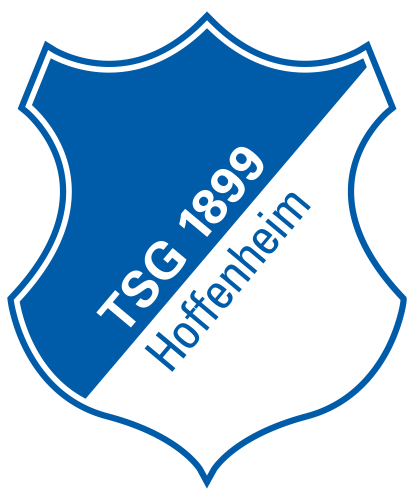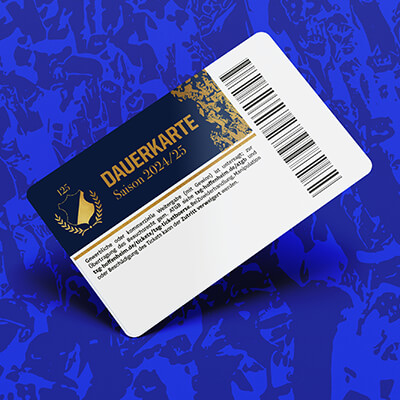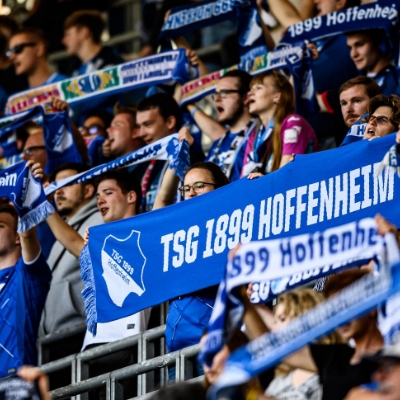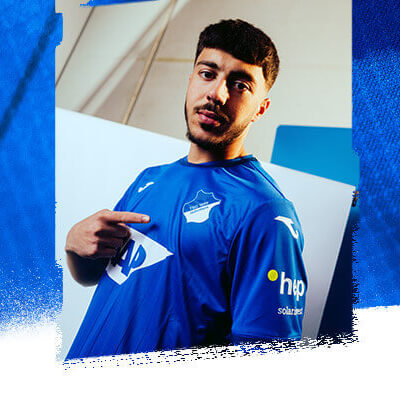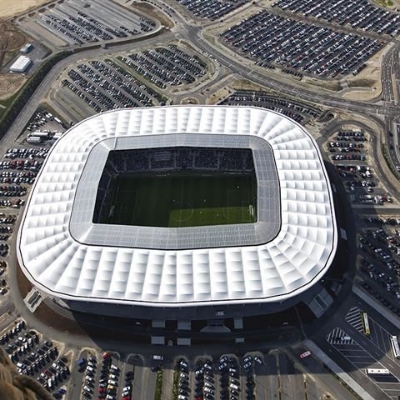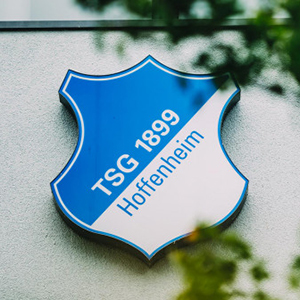Nordtveit: "We still have big ambitions"
Howie, you've taken us with you into the woods. We're sitting on a tree trunk, why did you choose this rather unusual setting for an interview?
"I love it out here. I belong in the woods, not in the city."
That's unusual, because many outside observers would probably associate a professional footballer more with expensive designer lounges or fashionable street cafes. That presumably doesn't apply to you?
"I'll go to a cafe now and again, it's not quite like that (laughs). But my close connection to nature can be traced back to my childhood. Even in nursery school back home in Norway, we would go for a walk in the woods once a day and would often picknick there together. As a young boy, I spent a lot of time outdoors. I feel at home in the woods and I also really love going there with my children to walk or play. There's a sense of freedom and we can do what we want. We like to go fishing, to go looking for small animals or to collect mushrooms."
So nature is your way of relaxing?
"Finding some peace in the hectic world of football – that's where nature does me good. And it's the same on holiday. I feel relaxed straightaway when I am in the silence of the woods, or when I climb into a boat to go fishing. Then I can let go, unwind and completely switch off. It's just great."
Let us in on the secret when it comes to fishing, what's the appeal?
"You might not believe it, but it's a total thrill for me. You're alone out there on the water. You can feel the power of nature; you have to completely immerse yourself and try to find out how the fish behave, what they eat and choose your bait accordingly. It all needs to go perfectly. When you get a bite from a fish, the battle begins. It can last five minutes but sometimes it can even be half an hour. I want my children to be able to feel the same freedoms as me and to come to appreciate nature in the same way. We take a boat out on the water as often as possible."
But your family still lives in Norway…
"That's true. We were travelling a lot with the children at the beginning but didn't find a flat in Heidelberg for a long time and eventually came to the decision that they would stay in Norway. They all attend the same nursery school, and my parents and my in-laws live in the immediate vicinity. My wife has always supported me and has always been there with me, whether it was in London, Spain or Gladbach. But now with three young children it's obviously not so easy to travel. However, at the beginning of February they had winter holidays and the family visited me for a week. That was amazing. We didn't get to fish, but the children can see elks here up close. Every time when they come to the stadium, they look for him and call out enthusiastically: "There he is, our Hoffi!" (laughs)
"I've experienced a lot in football"
A father belongs with his children. Will you return to Norway once you've hung up your boots as a player?
"That's the plan. I want to stay for two years and throw myself into TSG, but after that I will have been away from my home and my family for long enough. I have experienced a lot in football. I am very pleased, proud, and grateful too. Without sport, I couldn't live my life as it is now. Then I will go to my hometown team FK Haugesund in Norway and want to give something back to the club. First on the pitch, then later maybe as a club official. We will see."
But before then you want to achieve something with TSG?
"Absolutely, we want to get back into Europe. That's the objective for me personally and for the entire team. We want to be playing those midweek games again. It's a superb feeling."
Will it happen this year? How do you rate the chances?
"We have amassed a lot of points to date. It's always possible, but will involve a lot of work. We still have a lot of matches to go; we simply need to give our best and we'll find out in a few months. A lot can still happen."
"I always try to stay positive"
You sustained an injury this season while on international duty, directly after making your first appearance for TSG. You also missed the match against Werder Bremen in the second half of the season with a niggle, having just played yourself into the starting XI. How do you cope with setbacks like that?
"It's obviously difficult sometimes. We didn't want to take any risks against Bremen. We knew we would need all our substitutions, so it wouldn't have been possible for me to go off injured after five minutes. I was also thinking of the team. Akpo (editor's note: Kevin Akpoguma) was fully fit and we took the decision together. The most important thing was for us to get the three points. I always try to stay positive, in the knowledge that everyone gets their chance. That's something I've learned over the years. I don't really dwell on it too much when I'm injured, but instead prefer to concentrate on getting fit again. I then spend a lot of time at the training centre in Zuzenhausen, focusing fully on my recovery and working hard. But it does you the world of good to have a chat with the lads too. You're still a part of the team, even if you're out for an extended period of time. That's how it has to be, in good times and in bad. We're like a family. I'm delighted every day when I come to Zuzenhausen and see the lads."
Is that made any easier even if you're just on the bench for a few games, as you were in the first half-season?
"Absolutely. It all has a knock-on effect. Every club wants to win every match against every opponent, but the groundwork lies in the social contact between the player, the coaching staff and the support staff. Our team supervisor Ariane (editor's note: Weber) is the first face I see when I arrive in Zuzenhausen in the mornings. She's always in a good mood and her smile is contagious. That instantly has a knock-on effect on me. Things would be very different if there was not a good atmosphere here. Were that the case, we probably wouldn't train as well."
Are you really always so positive? Or is there a Howie that gets frustrated and cheesed off too?
"I was this way even as a young boy. I was always being told that I have too much energy. Perhaps that's true (laughs). Obviously, I do get angry sometimes, but it's over quickly. Life is too short to be in a bad mood. Especially if it's because of things that can't be changed. One such example is whether you're among the substitutes or you're playing. If something isn't going too well, you have to change that yourself. I've probably taken after my parents in that regard, but it's something they taught me too. The pair of them don't like to sit still, are consistently in a good mood and laugh a lot. As I've got older, I've noticed that that's really been helpful to me. If I were to be, excuse my language, an arsehole, it would be harder for me to find a club. This way it's a win-win situation for everyone. I'm not excessively positive. I'm just in a good mood.
Do you try to pass on this attitude to the younger players too?
"This season there was a home game where Baumi (editor's note: Christoph Baumgartner) had a chance to score. It would have been his first professional goal. After the match, I saw him in the changing room and asked him how he was doing. He said he should've scored the goal and was frustrated. I then made it clear to him that it was over now. You can't change it any more. You got into the position whereby you could score a goal. That's the most important thing. The goals will come by themselves at some point. I always try to help out. That was also the case in Gladbach too. Mahmoud Dahoud had made his breakthrough in the Bundesliga and I was still a substitute. Then he asked me: how can you be so positive even though you're playing so little?"
"It's only football at the end of the day"
And your answer was?
"I've always said that you need to keep things in perspective. You don't need to get down immediately. It's only football at the end of the day. You always have to recognise that. Perhaps your life is better if things are going well on the pitch, but it's still only football. There are more important things in life. The death of Kobe Bryant and his daughter threw into sharp relief how comparatively unimportant football can be. You can only imagine how that must feel for the family. It's horrendous. We can all be very happy that we're all doing so well. I have three healthy children and a wonderful wife. What reason do I have to complain?"
But you also experienced a meteoric rise as a young player and completed a switch to Arsenal at the age of 17.
"That was certainly intense. I made my debut in the Norwegian second tier at the age of 16. Arsenal then kept tabs on me for a year and one Sunday, my advisor came up to me to tell me that Arsene Wenger was coming to watch me personally. I couldn't believe it. We then had a discussion in the changing rooms and one of my team-mates told me that he'd seen Arsene Wenger. I was really nervous. Wenger, one of the most famous coaches in the world, was in my small hometown in Norway. That was unbelievable."
Following your signing, you were initially sent on loan several times and didn't make an appearance for the first team.
"In England, it's completely normal for you to go out on loan. The best loan spell I had was probably at Nuremberg (editor's note: 2009/10). I felt at that point that I wanted to experience more of Germany and the Bundesliga. Then in the winter of 2011, at the age of 21, I had the opportunity to join Borussia Mönchengladbach. Gladbach were in 18th place. With Lucien Favre at the helm, we managed to keep our place in the division and then went on a run that took us into the Champions League. It was totally crazy. A career in professional football is like a loop. I believe that you only realise all of what you have achieved at the end of your career. The five years at Gladbach were my breakthrough and I established myself at the highest level."
How do you look back on your career to date? If there anything that you would do differently?
"I've always said to myself that I don't want to say I would've done something differently. I've always given everything and I believe that I've got the most out of my career that I possibly could have. If I were to look back at it now, then I can say that it was a superb time. And that certainly isn't going to change in the almost two and a half years that I still have on my contract at TSG. We still have big ambitions."



